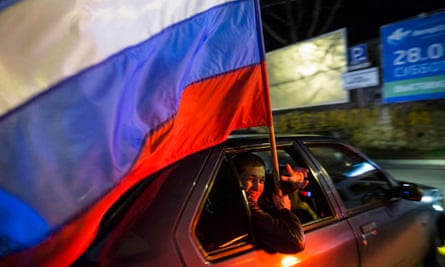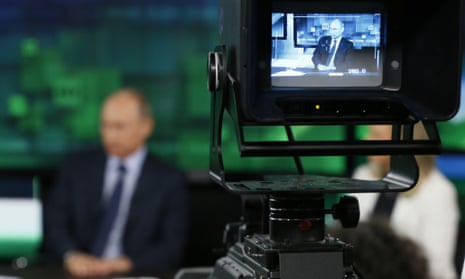There is something of a panic in the west at the moment over fears that it is losing the “information war” with Russia.
On one level, this may be true. The Kremlin is undoubtedly engaged in a multi-front, multi-message, multimedia campaign to undermine America and Europe.
Everything from the pre-eminence given tin-hatted conspiracy theorists on the English-language state TV channel RT to the infamous troll houses and the efforts to demonise figures such as US State Department spokeswoman, Jen Psaki, testify to this.
But before the west turns to info-warriors of its own, it ought to consider the weaknesses and consequences of the Russian campaign.
It is, primarily, a negative strategy. If anything, opinion polls show dwindling trust in and goodwill towards Russia around the world. Pew Research Center surveys found that between 2013 and 2014 negative views of Russia rose from 54 to 74% in Europe, with the country’s reputation failing to improve in any corner of the globe.
Russia’s aim, though, is not so much to accumulate its own “soft power” as to undermine the west’s ability to act against it. At that, it has certainly had some success.
Many Nato members are becoming increasingly worried about the risk of being sucked into a wider conflict with the former superpower. At a time when their leaders are talking about the need for a tougher line against Russian expansionism, their electorates are uncomfortable. The sharpest indication of this split is in Germany, where many say they would not want to support a Nato partner facing Russian aggression.
The Russian information war has helped hide the ground truths of Ukraine within a cloud of rumour, innuendo, misinformation and spin. Whatever one may think about the “Maidan” protests that brought down the former government, the current government in Kiev was elected and is not a neo-fascist junta, as is often suggested
Whatever one may think about the Crimean vote to join Russia, the annexation was illegitimate under international law, and the fact that this continues to be debated attests to the successes of the Russian media campaign.
But let’s not assume that all of the innuendo and debate is a product of the Russian info-war, or that the Kremlin is a grandmaster of the memetic chessboard. These debates also reflect an underlying malaise of politics, leadership and legitimacy in the west.
We are willing to doubt the mainstream not because RT exhorts us to “question more”, as its slogan goes, but because we are already ready to believe that our leaders, our power structures and even our media lie to us.

We find ourselves exposed to conspiracy theories and sensationalist nonsense not because of the Russians so much as our own competitive media environments and the speed with which a funny, compelling or exciting lie or half-truth can be reposted, retweeted and re-reported around the world – outdistancing any fact-checking or sober analysis.
In this climate, the west is simply suffering from its own internal contradictions. The Russians have been able to exploit them but they have also often demonstrated themselves to be counter-productively clumsy.
Those troll farms whose “sophistication” is often vaunted by western alarmists have become a story in their own right — and anyone wanting to present the Russian perspective in an online forum now runs the risk of being taken for one.
While on the one hand attempts are made to woo German opinion, on the other Russian hackers break into Bundestag computers – probably gaining no more than trivial intelligence but undoing whatever work the media may have done.
In short, neither the Kremlin nor western governments should assume that the “info-sphere” is a simple battlefield on which disciplined forces wheel and charge. It is, at best, a cacophonous forum where umpteen rival voices struggle to be heard.
Russia may have a megaphone, but this just means that when its message is laughable or offensive it can alienate more people at once.
Now the European Union has launched an East StratCom Team to spread its “values” within the EU and the so-called eastern neighbourhood countries, including Ukraine, Belarus, Moldova, and Russia itself. But an organisation currently struggling to sell itself to sceptical audiences from England to Greece should be cautious about entering into full-blown information warfare.
As soon as such organs are created the temptation is to use them to spin and spread messages that edge closer and closer into outright propaganda. This mistake was made in the early years of the cold war, before the west realised that the most powerful counter to lies is not other lies, but the truth.
Yet the west’s weaknesses are also its strengths: a plurality of opinions, an innately sceptical attitude, a willingness to revisit old assumptions. In the short term these may create vulnerability but in the long term they bring resilience.
The infamous declaration by Dmitry Kiselyov, the journalist who heads the state news agency Rossia Segodnya, that “objectivity is a myth that is being imposed on us” could stand as the motto of Russia’s information warfare campaign – or perhaps some day as its epitaph.–
Mark Galeotti is a Russian security expert at New York University. A version of this article first appeared in The Moscow Times

Comments (…)
Sign in or create your Guardian account to join the discussion